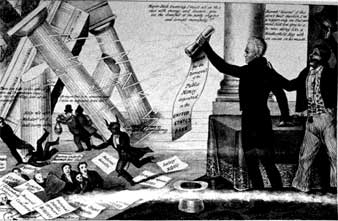
Jackson and the Bank
Jackson campaigned against the Bank of the United States, because he saw it as an instrument of the Eastern moneyed class. He did not renew its charter, and it ceased to exist in 1836. Replacing the Bank of the United States were local state banks, which lent out money much more freely.
The Second Bank of the United States was the largest corporation in America. This bank held the tax receipts of the government and handled the disbursements as well. Like all banks during this period, the Second Bank of the United States issued its own paper currency. Unlike the paper money issued by other banks, the notes issued by the Bank of the United States carried the full guarantee of the U.S. government. The Second Bank of the U.S. also made loans to other banks, businesses, and private individuals. It handled all of the foreign exchange transactions for the country. Nicholas Biddle headed the bank, which was located in Philadelphia.
Andrew Jackson came to power with a distinct distaste for banks in general and a specific dislike for the Second Bank of the United States. The bank was operating under a 20-year charter granted by the United States government, due to expire in 1836. The Bank was generally popular and well-run by all accounts. However, Jackson initially gave conflicting messages—first attacking the bank and then having his cabinet members offer words of assurance. Biddle, the Bank’s head, had supported Jackson and was not initially worried about Jackson’s position on the renewal of the charter. However, Jackson’s constant attacks on the bank (starting with his first annual message to Congress) soon gave Biddle pause. Over time, Biddle became convinced that Jackson would oppose the renewal of the charter.
Biddle decided to try to outsmart Jackson by asking for the renewal of the charter before the election of 1832, requesting that Congress renew the bank’s charter in January 1832. Pro-Jackson members of Congress tried to delay the vote by authorizing an investigation into the bank, but no wrongdoing or mismanagement could be found. The renewal of the bank’s charter passed overwhelmingly in the Democratic House of Representatives by a vote of 107 to 85. President Jackson, however, was not going to agree to the extension of the Second Bank of the U.S. When Martin Van Buren returned from England (after the Senate failed to confirm him as Ambassador to England), Jackson stated: “The bank is trying to kill me, but I will kill it.”
On July 10, 1832, Jackson issued what many historians consider the most important veto message in American history. He could not really attack the bank on economic or operational grounds. Instead, Jackson attacked the bank’s partial foreign ownership (Europeans owned non-voting stock in the bank). Jackson claimed there was no provision in the U.S. Constitution to allow the bank to exist—despite Supreme Court decisions to the contrary. Jackson returned to his populist roots when he stated the following in his veto message:
“It is to be regretted that the rich and powerful too often bend the acts of government to their selfish purposes. Distinctions in society will always exist under every just government. Equality of talents, of education, or of wealth cannot be produced by human institutions. In the full enjoyment of the gifts of Heaven and the fruits of superior industry, economy, and virtue, every man is equally entitled to protection by law, but when the laws undertake to add to these natural and just advantages artificial distinctions, to grant titles, gratuities, and exclusive privileges, to make the rich richer and the potent more powerful, the humble members of society—the farmers, mechanics, and laborers—who have neither the time nor the means of securing like favors to themselves, have a right to complain of the injustice of their Government. There are no necessary evils in government. Its evils exist only in its abuses. If it would confine itself to equal protection and, as Heaven does its rains, shower its favors alike on the high and the low, the rich and the poor, it would be an unqualified blessing. In the act before me, there seems to be a wide and unnecessary departure from these just principles.”
Congress did not have the votes to override Jackson’s veto. The Second Bank’s charter would run out in 1836. However, that was not enough for Jackson. He wanted to remove federal money from the bank. None of his cabinet supported such a move. Furthermore, thanks to an act of Congress, the executive branch could only remove money from the bank if the Treasury Secretary stipulated that the government’s money was not safe in the bank. As the bank’s finances were sound, Jackson’s Secretary of the Treasury refused to certify the bank as unsound. Jackson then replaced him and appointed a new Treasury Secretary. He, too, refused to certify the bank as unsound and was dismissed as a result. Jackson then appointed his Attorney General, Roger Taney, as the temporary Secretary of the Treasury. Taney slowly removed the government’s money from the bank by not depositing any new money in the Second Bank while at the same time paying out the government’s expenses from those funds. There were those in Congress who wanted to impeach President Jackson for his actions. However, they knew they did not have the votes. The Senate censured him instead. Jackson was the only President to be so censured.
 >
>